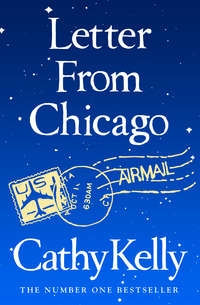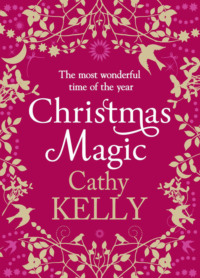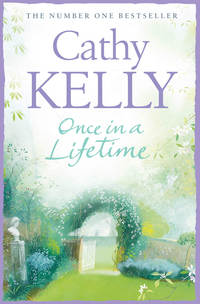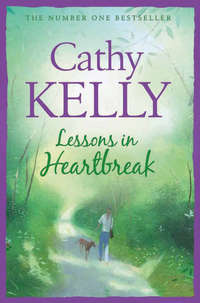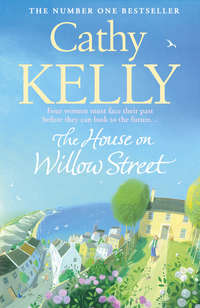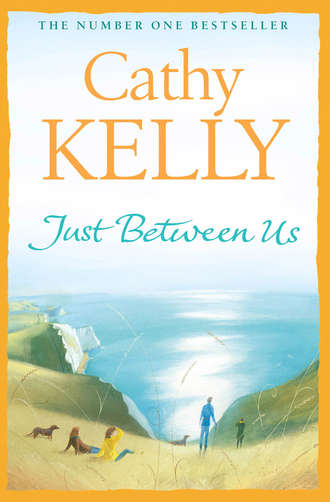
Полная версия
Just Between Us

Just Between Us
Cathy Kelly

Copyright
Published by HarperCollinsPublishers Ltd 1 London Bridge Street London SE1 9GF
www.harpercollins.co.uk
Copyright © Cathy Kelly 2002
Cathy Kelly asserts the moral right to be identified as the author of this work
A catalogue record for this book is available from the British Library
This novel is entirely a work of fiction. The names, characters and incidents portrayed in it are the work of the author’s imagination. Any resemblance to actual persons, living or dead, events or localities is entirely coincidental.
All rights reserved under International and Pan-American Copyright Conventions. By payment of the required fees, you have been granted the non-exclusive, non-transferable right to access and read the text of this e-book onscreen. No part of this text may be reproduced, transmitted, downloaded, decompiled, reverse engineered, or stored in or introduced into any information storage and retrieval system, in any form or by any means, whether electronic or mechanical, now known or hereinafter invented, without the express written permission of HarperCollins e-books.
HarperCollinsPublishers has made every reasonable effort to ensure that any picture content and written content in this ebook has been included or removed in accordance with the contractual and technological constraints in operation at the time of publication.
Source ISBN: 9780007268641
Ebook Edition © FEBRUARY 2012 ISBN: 9780007389322
Version: 2017-11-21
Praise for Cathy Kelly:
‘A must for Kelly’s many fans; a warm, moving read.’
Daily Mail
‘Totally believable.’
Rosamunde Pilcher
‘An upbeat and diverting tale skilfully told…Kelly knows what her readers want and consistently delivers.’
Sunday Independent
‘An absorbing, heart-warming tale.’
Company
‘Her skill at dealing with the complexities of modern life, marriage and families is put to good effect as she teases out the secrets of her characters.’
Choice
‘Kelly dramatises her story with plenty of sparky humour.’
The Times
‘Kelly has an admirable capacity to make the readers identify, in turn, with each of her female characters…’
Irish Independent
To John, with love
Table of Contents
Cover Page
Title Page
Copyright
Praise for Cathy Kelly:
Dedication
PROLOGUE: MARCH
CHAPTER ONE
CHAPTER TWO
CHAPTER THREE
CHAPTER FOUR
CHAPTER FIVE
CHAPTER SIX
CHAPTER SEVEN
CHAPTER EIGHT
CHAPTER NINE
CHAPTER TEN
CHAPTER ELEVEN
CHAPTER TWELVE
CHAPTER THIRTEEN
CHAPTER FOURTEEN
CHAPTER FIFTEEN
CHAPTER SIXTEEN
CHAPTER SEVENTEEN
CHAPTER EIGHTEEN
CHAPTER NINETEEN
CHAPTER TWENTY
CHAPTER TWENTY-ONE
CHAPTER TWENTY-TWO
CHAPTER TWENTY-THREE
CHAPTER TWENTY-FOUR
CHAPTER TWENTY-FIVE
CHAPTER TWENTY-SIX
CHAPTER TWENTY-SEVEN
CHAPTER TWENTY-EIGHT
CHAPTER TWENTY-NINE
CHAPTER THIRTY
CHAPTER THIRTY-ONE
CHAPTER THIRTY-TWO
CHAPTER THIRTY-THREE
CHAPTER THIRTY-FOUR
CHAPTER THIRTY-FIVE
CHAPTER THIRTY-SIX
CHAPTER THIRTY-SEVEN
CHAPTER THIRTY-EIGHT
CHAPTER THIRTY-NINE
CHAPTER FORTY
KEEP READING
Acknowledgements
Excerpt from The House on Willow Street
Prologue
Chapter One
Back Ads
About the Author
By the same author:
About the Publisher
PROLOGUE: MARCH
Adele looked at the invitation and wondered exactly how much it would cost to print up at least a hundred such creamy, expensive cards. A fortune, she’d bet. It was the embossing that cost so much. And for all that it looked so nice, it was a waste of money.
There were perfectly acceptable invitations available in the newsagent’s – ones that you filled in yourself – but clearly, run-of-the-mill invitations weren’t good enough for her sister-in-law. But then, Rose had always had notions above her station.
Adele ran a deeply disapproving finger over the extravagant letters.
Rose & Hugh Miller have great pleasure in inviting Adele Miller to a lunch party to celebrate their Ruby Wedding Anniversary on Saturday, April 25th at Meadow Lodge, Kinvarra.
She scanned down to the dress code, which was ‘smart casual’, whatever that meant.
She’d wear one of her knitted suits, as she always did. She might be sixty-five, but she was proud of the fact that she was still trimmer than many women of her age. Maybe a shawl just in case it was cold, because it would only be April, and the party was going to be in a marquee and not in the actual house. Adele hadn’t been keen on the idea of a marquee. Talk about a waste of money, not to mention delusions of grandeur. Then Hugh had told her it had been his idea, which had suddenly made the whole plan sound like a great idea after all.
‘A big party in the house could destroy the place, what with high heels digging into the wooden floors and red wine on the chairs, you know that, Della my love,’ Hugh had said the previous week when he’d popped in on his way back from a meeting with a client in a nearby town. Adele had smiled fondly at her little brother as he tucked into the steak sandwich she’d made for him as a little treat. He was the only person in the world who still called her Della. Not that Adele would have permitted anyone else to call her by a pet name. Even the doctor she’d known for forty years was on pain of death to call her anything but Miss Miller. The cheeky pup of a postman had tried to call her by her first name once, but Adele had soon put a halt to his gallop. She wasn’t one for modern ideas of familiarity.
But Hugh could call her any name he liked. Her darling brother could do no wrong.
‘You’ve got to have a party for your fortieth wedding anniversary,’ Hugh went on, munching his sandwich appreciatively. Hugh liked his food. He was a big man after all, and handsome, Adele thought, with that six-foot frame and the shock of silver hair. His hair had been an Arctic white-blond once, so he was truly a golden boy. All Adele’s friends had been half in love with him all those years ago. If only she’d found a man like her brother, she might have married too, she thought wistfully.
She glanced down at the invitation. ‘RSVP’ it said. No time like the present.
Her sister-in-law answered on the third ring, sounding out of breath.
‘Hi, Adele,’ Rose said, ‘I was just running the vacuum over the rugs. The place is such a mess.’
Adele thought this was highly unlikely. Her sister-in-law’s home, eight miles away on the other side of the sprawling country town of Kinvarra, was always sparkling. And elegant too. Although it irked Adele to admit it, Rose did have fabulous taste. Who else would have thought of knocking down all those internal walls to transform the rather dark reception rooms into a well-proportioned open-plan space? Adele preferred carpets herself, but the pale wooden floors with their muted rugs looked elegantly modern and fresh compared with the conservative dark maroon carpet that graced Adele’s more traditional Victorian-style house.
‘I got the invitation,’ Adele said stiffly.
‘Did you like it?’ asked Rose. ‘Hugh picked it. I feel a bit guilty spending so much, Adele. They’ve just laid off twenty more people in the tyre factory down the road, you know, and here we are having a big party with a marquee and caterers and flowers…The poverty action group is in serious need of funds and all this excess doesn’t seem right…’ Her voice trailed off but, in her indignation, Adele didn’t notice.
‘My brother’s an important person in Kinvarra; people would think it odd if he didn’t celebrate according to his status,’ Adele said stiffly. ‘They’d certainly think it was odd if you didn’t have a grand party for your ruby anniversary.’ Rose seemed to forget that the Miller family were pillars of the community. How would it look if they weren’t seen to be doing things properly? People might talk. Adele was deeply against having people talk about the family.
‘You’re right, Adele,’ Rose said lightly. ‘I’m getting paranoid in my old age; I worry about the silliest things. I do hope you can make it? Hugh would be devastated if you couldn’t. We all would be. It wouldn’t be the same without you,’ she added kindly.
Adele pursed her lips. This was not going as planned. She hadn’t meant to endorse the whole event, certainly not without some reservations. But for Rose to even imply that she, Adele, might miss it! Her darling brother’s party. By rights, no arrangements should have been made until she had been consulted. She was the oldest member of the Miller clan, three years older than Hugh. She should have been consulted. What if she’d had something planned and couldn’t manage the third Saturday in April?
‘I must fly, Adele,’ Rose was saying in that low, soft, accentless voice of hers. Adele often wondered how Rose had drilled the accent out of her speech. ‘I’ve got another call coming in. Probably the florist. Thank you for calling so early, you are a love. Take care. Bye.’
And she was gone, leaving Adele as highly vexed as she usually was after conversations with her sister-in-law. Florist indeed. Far from florists Rose had been reared. The Miller family had always had lovely flowers in the house, of course. They’d had a maid, for God’s sake, when nobody else in the country had one. But Rose came from a tumbledown house on some backroad in Wexford; a house with slates coming off the roof and plumbing out of the Ark. There hadn’t been enough money for food in the Riordain house, never mind flowers. Marrying Hugh had been Rose’s ticket out of there. Adele glowered at the phone. She had a good mind to phone back and point out that Rose could do the flowers herself and not waste money on a florist. Rose had a knack with flowers. As if in honour of her name, in summer there were always roses all over the place: blowsy yellow ones that matched the buttercup yellow walls and a big china bowl of riotous pink blooms which usually sat on a low, Scandinavian coffee table. All Rose ever did was to carelessly place a handpicked bouquet in a vase and the flowers all fell into place beautifully. She was the same when it came to clothes, thought Adele resentfully. The oldest white shirt looked elegantly informal on Rose Miller because she always had some trick of pinning her dark hair into a soft knot, or of hanging a strand of pearls around her neck, and then she looked instantly right.
Adele had spent years doing her best not to resent Rose. It hadn’t been easy, for all that Rose was so kind to her. Kindness, like other people’s happiness, could be very hard to deal with. And speaking of happiness, here was more proof of how lucky Rose was. She had a lovely home, three grown-up daughters, Stella, Tara and Holly, who’d never given her an iota of bother, and no financial worries, thanks to dear Hugh.
Hugh, Adele had always felt, was the real reason that Rose had had such a wonderful life. Adele adored her baby brother passionately. He was so clever and kind. He’d plucked Rose from an impoverished background and her dull secretarial job and turned her into a Miller lady. And now Hugh and Rose were celebrating their ruby wedding anniversary, complete with uniformed caterers and florists, the whole nine yards. It was like their wedding all over again, Adele thought bitterly, remembering herself, a drab bridesmaid next to the radiant Rose. All eyes had been on the bride with tiny coral-pink rosebuds pinned into the cloud of her dark hair. Even Colin, Adele’s young man, had remarked upon how lovely Rose looked.
‘Good old Hugh.’ Colin had been frankly envious. ‘He’s a lucky fellow to be marrying a girl like her.’
Adele had never forgiven Colin for not understanding how much she felt she’d lost Hugh to Rose. She’d spent hours pinning her fair hair up with little hair clips to show off her long neck and had even dabbed on a bit of rouge and Coral Surprise lipstick, angry with herself for giving in to vanity. It had been no good. Rose had glittered like the sun, overshadowing Adele without even meaning to, and Adele had never, ever been able to forgive her.
Lost in her memories, for a moment Adele let her customary guard down. Her normally stiff back drooped and she sank down onto the arm of a faded old wing chair. If she’d said yes to Colin all those years ago, would she have had a golden life, a family like Hugh and Rose? Colin had been a nice man, sweet and gentle. He simply hadn’t measured up when compared to Hugh, though. Nobody could. At the time, measuring up to Hugh had seemed very important, but now it was different. Adele was lonely. The sidelines were cold and she was always on them, watching other people’s lives and, somehow, not feeling a part of it all. While Rose had everything. Everything. Why had Lady Luck shone so brightly on Rose, who was only a Miller by marriage, and utterly bypassed Adele?
Even the autumn blight that had savaged Adele’s beech hedge had left her sister-in-law’s untouched. And Rose had her beloved girls, the golden Miller girls. Those three girls had led charmed lives, Adele felt, and though they’d undoubtedly been indulged by Hugh, it had all turned out so well.
Adele went to the desk where she kept her stamps and notepad, and wrote formally to accept the invitation to the anniversary party. The phone call had been more in the line of information gathering, rather than an actual response. Adele Miller had been brought up properly, and written invitations got a written reply. It was the kind of behaviour that implied breeding, the sort of thing that people who were dragged up in little cottages in the back of beyond didn’t understand.
‘I would be delighted to attend…’ wrote Adele, her language as formal as the Queen’s. She sighed. Despite everything, she was looking forward to the party, actually. Parties in Hugh’s were always fun and a fortieth wedding anniversary was sure to be a splendid affair. She’d get her hair set, of course. Happier at this thought, Adele began to plan.
CHAPTER ONE
The previous December: two weeks before Christmas
Rose Miller hated committees. Which was a bit unfortunate, because she was on three of them. The Kinvarra Charity Committee was the most irritating for the simple reason that its internal wranglings took so much time, there wasn’t a moment left to actually raise any money for charity. Discussions about the size of the type on the menus for the annual ladies’ lunch, and whether to serve salmon or beef, had taken endless phone calls and two lengthy meetings. If Rose hadn’t practically lost her temper, the committee would still be arguing over it.
‘Does it really matter what the menus look like or what we eat?’ she’d demanded fierily at the final, drawn-out meeting, rising to her feet and making all the other committee ladies clutch their copies of the minutes in shock. Mrs Rose Miller with her dark eyes flashing in anger was not a common sight. A tireless worker for the local charities, she was known for her calm self-possession and for her organisational skills. Tall and strikingly elegant with her trademark upswept hairdo, she was almost regal in her anger. ‘We’re here to raise money, not waste it. Is this our best effort for the underprivileged of this town? To sit in a cosy hotel bar and slurp our way through urns of coffee and entire boxes of custard creams while we discuss minutiae?’
‘Good point,’ squeaked Mrs Freidland, the current chairwoman, who’d been stubbornly holding out for flowing script type and seafood chowder followed by beef despite the fact that the majority wanted salmon for the main course and tiger prawns to start. ‘We’ve been wasting far too much time; let’s stop arguing and vote.’
Feeling rather shocked at her own outburst, Rose sat down and wondered, as she did every year, why she didn’t just resign and take up something less stressful, like hang-gliding or swimming with sharks. But every year she let her name be put forward because, if she wasn’t on the committee, no money would be raised at all. And she passionately wanted to help people. A life lived selfishly was a life half lived: that was her credo. The only difficulty was that for some of the other committee members, charity work was more a sign of social status than anything else.
The Church Hospitality Committee only met a couple of times a year and was the least trouble, as it only involved putting together a couple of suppers for inter-church gatherings and, occasionally, a party for a visiting missionary priest.
Rose’s third committee, the Kinvarra Motorway Action Group, was halfway up the scale of annoyance. Set up to oppose the proposed new route through Kinvarra’s nature park, an area of outstanding beauty around the midlands town, the KMAG committee included a highly efficient local solicitor, several prominent business people and three local politicians. Therefore things got done. But the public meetings were a total nightmare which usually ended up with the committee being instructed to work on at least four wildly differing approaches.
Rose needed a stiff gin and tonic after the KMAG public meetings, although Hugh grinned and told her that in his experience of public meetings, she’d be better off with a stiff drink beforehand.
As one of Kinvarra’s leading legal brains, Hugh was a committee veteran. He’d even served his time as the town’s mayor many years before, which he laughingly said had been a lesson to him Not To Get Involved. Rose had a photo of him in his mayoral robes on the mantelpiece: tall, stately and handsome with his immaculately brushed silver hair setting off the high forehead and the benevolent gaze. The camera hadn’t picked up the wicked glint in Hugh’s eyes that day, a look that said he didn’t mind the job but could have done without the mayoral necklace hanging like a cow chain around his neck.
‘It’s impossible to please even half the people a quarter of the time,’ was Hugh’s sage advice on committees. ‘Everyone goes round in circles for weeks. As for your public meetings, unless someone takes the planners to court, you’re wasting your time.’
‘We will if we have to,’ said Rose heatedly. ‘But we must show our solidarity as a community. We don’t want to be walked on. Don’t you care about the motorway?’
‘It won’t be anywhere near our house,’ Hugh pointed out.
Rose gave up. She found it hard to understand how Hugh could be so pragmatic about important matters. She herself became passionately involved in all her causes, whether they affected her directly or not, but Hugh didn’t seem to feel these things as deeply as Rose.
The girls had all taken after their mother. Thirty-eight-year-old Stella, for all she appeared to be a sensible lawyer, working hard to bring up her daughter on her own, hid a romantic soul beneath her sober office suits. Tara, seven years younger, was the same: a debating queen at school and college, she threw herself wholeheartedly into anything she did. She’d fallen in love the same way, marrying computer sales executive Finn Jefferson six months to the day after they met, half-astonishing people who thought that Tara was destined for unconventionality and liable to run off with a rock star if the mood took her.
And as for Holly, the baby of the family at twenty-seven, Rose knew that beneath her youngest daughter’s gentle exterior there was a vulnerable, fiercely passionate heart. But while Tara and Stella had the courage to fight for what they believed in, Holly didn’t. The secret fear that Rose carried round with her, was that Holly lacked self-confidence because of Rose and because of what she had or hadn’t done. Somehow, Rose felt, she had failed her beloved youngest daughter. But the thought was too painful, and Rose Miller, known for facing all kinds of problems with calm resilience, blocked it out. She wouldn’t, couldn’t think about it.
Today was the dreaded Kinvarra Charity Committee and as Rose parked her car outside Minnie Wilson’s sedate semi-detached house, she had a sudden desire to take off on a mad shopping spree and forget all about the meeting. Instead, she did what was expected of a sensible Kinvarra matron; she checked her lipstick in the mirror, re-pinned a wayward strand of her greying dark hair back into its elegant knot and carried a home-made lemon cake up the path.
‘Rose, is that the time? I’m all at sixes and sevens, I’m not a bit organised!’ wailed Minnie when she answered the door.
Rose gritted her teeth into a smile and walked in. Minnie had to be at least Rose’s age, round the sixty mark, but had the manner of a dizzy young girl and got flustered at the slightest provocation. Minnie was one of the people who’d worried so much about the type size on the charity lunch menus. She’d moved to Kinvarra three years ago when her husband retired and she’d thrown herself so frenetically into local affairs, it felt as if she’d been part of the community for years.
‘Don’t worry, Minnie, I’ll help,’ Rose said automatically. ‘What do you want me to do?’
‘Well…’ said Minnie anxiously. ‘The kettle’s boiled but I haven’t got the cups out. And look at my hair…’
Hang-gliding, definitely. It had to be more fun than this, Rose reflected. ‘Why don’t you go and fix your hair, Minnie,’ she said calmly, ‘while I sort out the tea.’
Minnie fluttered off upstairs and Rose grimly thought that the group’s chosen charities would be better served if its members all just sent a cheque every year to the charity of their choice. They’d save money spent on endless tea mornings where at least half the time was spent on the process of sorting everyone out with seats, cups and plates of cake.
Rose briskly organised the tea, her mind elsewhere. She often wondered how had she ended up in this life. She’d never wanted to be a pillar of the community and a leading light of every local concern going. When she was eighteen, she’d wanted to work in a modern office in the city, where people addressed her respectfully as Miss Riordain and where a wage packet with the anticipated amount of money was put into her hand every week without fail. The respect and the unchanging wage packet were important. On her father’s tiny farm, income fluctuated wildly, resulting in lean times and very lean times. Nobody felt the need to show particular respect to the beautiful and clever daughter of a small farmer and Rose had grown up deeply aware of the nuances of how people treated the daughters of the local doctor and the big landowners. One of her ambitions was to receive such respect. A good, settled job and a pay packet that came every week would give her freedom. She’d got her foot on the ladder all right, with the junior secretarial job in a construction company. Efficient and eager to learn, she’d dedicated herself to self-improvement. She’d battled with an elderly typewriter until her nails broke and she watched the senior secretary for hints on how she should dress. And then she’d met Hugh, the dashing young lawyer friend of the owner’s son. Hugh came from a world where people never needed to be told how to dress or which fork to use. But to two people in love, that didn’t matter. They were soul mates. Love turned Rose’s life plan upside down and within two years she was married with a small daughter.


